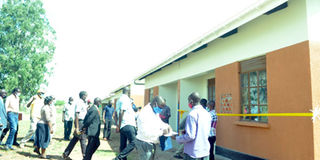Prime
New staff quarters to improve service delivery at health centre

Officials from the Office of the Prime Minister and those from Lamwo District inspect the new staff quarters at Palabek-kal Health Centre III during the commissioning ceremony on Tuesday last week. PHOTO | TOBBIAS JOLLY OWINY
What you need to know:
- He recalls how antenatal care services at the facility were suspended for a week following fears that the rooftop of the maternity ward would collapse on expectant mothers.
- Health care services have since resumed, albeit from a new and better location.
Mr Richard Omoya is the chairman of Lakwa Village, neighbouring Palabek Health Centre III in Palabek-kal Sub-county in Lamwo District.
He recalls how antenatal care services at the facility were suspended for a week following fears that the rooftop of the maternity ward would collapse on expectant mothers.
Health care services have since resumed, albeit from a new and better location.
The facility’s theatre was instead turned into the maternity ward.
“The health unit management decided that the facility’s theatre be turned into a maternity ward. To date, the maternity ward has not been repaired for use, despite lobbying for its repair or construction of a new one,” Mr Omoya says.
Although the biggest challenge had been limited workspace to serve thousands of patients who visit the facility every month, Mr Joseph Onama, the chairperson of the health unit management committee, at the facility, says the situation was worsened by lack of staff accommodation.
“The few staff we have here would only serve for a few hours and leave because they commuted from long distances,” Mr Onama says.
Daily Monitor has learnt that by June, only five of the 13 health workers were residing at the health facility due to limited accommodation at facility.
“We were only saved by the government a year ago when it started constructing housing units to accommodate staff,” Mr Onama adds.
Intervention
A year ago, the government commenced the construction of five housing units at the health facility under the Development Response to Displacement Impact Project (DRDIP) implemented under the Office of the Prime Minister (OPM).
Last week, Relief and Disaster Preparedness minister Hilary Onek commissioned the staff houses constructed at a cost of Shs2b with a caution to the health workers to revamp the slumping services at the facility.
“These facilities should be put to their best use, I do not wish to hear that patients are abandoned because the health workers are arriving late and leaving too early because they are commuting from far places,” Mr Onek said.
Each of the five blocks of the staff houses consists of two units that accommodate two staff.
Each unit has two bedrooms, a sitting room, bathroom and store, as well as an outside kitchen and pit-latrine.
The facilities are connected to both electricity and solar power.
Speaking to this newspaper last week, Mr Francis Okumu, the officer-in-charge of the facility, said the health centre had become vulnerable to pressures exerted by the huge number of refugees who access services at the facility.
Due to lack of water and associated facilities, Palabek Health Centre III still uses pit latrines instead of water-borne toilets, a risk that stands to further spread infections among patients, health workers and the communities neighbouring the facility.
Palabek Health Centre III receives and serves averagely 150 patients per day, with the majority being South Sudan refugees residing in the nearby Palabek-ogili and Palabek-kal refugee settlements.
The number (of patients) totals to more than 115,000 per month, more than the average of both Kitgum General Hospital and St Joseph Hospital. It is established that the two facilities located in Kitgum Town receive about 220,000 patients combined, per month.
Although it currently has only 13 out of the required 19 staff members, Mr Okumu says 11 of the 13 presently reside in the new staff housing.
About DRDIP
Development Response to Displacement Impact Project (DRDIP) is a regional project focusing on addressing the impacts of the protracted presence of refugees on the hosting communities in the four countries of Djibouti, Ethiopia, Kenya and Uganda.
The objective is to improve access to basic social services (health, education, water and sanitation), expand economic opportunities and enhance environmental management for refugee host communities and settlements.
The project addresses the social, economic, and environmental impacts of protracted refugee presence in the host communities and refugee settlements through interlinked and investment components.



